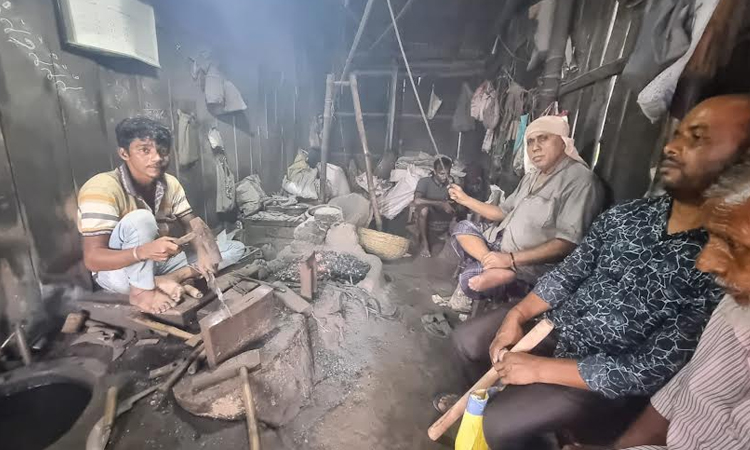News Flash
News Flash

Khulna, May 28, 2025 (BSS) - With Eid-ul-Azha approaching, blacksmiths in Khulna are passing busy days making sharp tools for slaughtering and meat processing of sacrificial animals.
While the rest of the year remains relatively quiet for these artisans, the Eid season brings a flurry of work, and they hope for good profits.
The blacksmith workshops in different areas of Khulna city, including Borobazar, Thana Mor, Khalishpur, and Daulatpur, are buzzing with the sound of hammers striking heated iron.
Despite the visible fatigue on their faces, the workers are filled with vitality as they keep up with the high demand for their tools.
Artisans said the rush begins about a month ahead of Eid and continues until the last night before the festival.
As affluent families rush to buy sacrificial animals, blacksmiths are equally busy, from dawn till late night, meeting the surge in demand for knives, cleavers, and other slaughtering tools, often at two or three times the usual volume.
Babul Karmakar, a blacksmith from Mohsin Mor at the Hazi Daulatpur area, said, "Eid-ul-Azha is just around the corner. We've been working non-stop for weeks. Almost every shop is now operating late into the night to meet customers' demand."
During the Eid rush, their daily working hours expand significantly. "Earlier we used to open around 10 am and close after sunset. But now we start from 8 am and work until midnight, sometimes even throughout the night before Eid," said Amit Saha, a blacksmith from the City's Satrastar Mor area.
During this peak season, small blacksmith shops in Khulna can earn between Taka 40,000 and Taka 50,000 during the Eid season, with daily earnings ranging from Taka 3,000 to Taka 6,000, depending on sales volume.
Biplob Karmakar, a shop owner at Borobazar, said, "There are only a few days left until Eid-ul-Azha. The preparation is in full swing. We charge between Taka 30 and Taka 50 for sharpening knives, though some charge Taka 50 to Taka 100 depending on size and sharpness."
A small cleaver costs around Taka 300 to Taka 400, while knives are priced between Taka 50 to Taka 150 based on size and quality. Larger cleavers are sold for Taka 600 to Taka 700. Prices vary depending on weight and design. Machetes (locally known as `da') are being sold for Taka 300 to Taka 600 each.
The City's Thana Mor area remains one of the busiest locations for blacksmiths. Most shops are well-stocked with iron tools, and many customers bring in their own materials to custom-make knives and cleavers.
Although there is demand for machetes (da) and cleavers year-round, the Eid season brings a spike in orders for more specialized items such as skinning knives, meat cleavers, and traditional blades like 'chapati' and dhama.
Rubel Karmakar, a blacksmith from the Borobazar area, said, "Before Eid, demand rises not only for knives and cleavers, but also for unique blades. Since some of these items don't sell well throughout the year, we offer them at lower prices. However, with growing Eid demand, we start getting fresh orders."
Meanwhile, seasonal blacksmiths are also seen across the city. Many of them rent closed shops or set up makeshift stalls in open areas to make, sharpen, and repair tools. These workers, usually engaged in other professions during the rest of the year, return during Eid for extra income.
In the Gallamari market area, a seasonal blacksmith named Sanjay Karmakar said: "People like me switch professions during the rest of the year due to low demand, but we come back during Eid as it's a good time to earn some extra income."
Md Baharul Islam, a residence of the Boyra area, who came to buy new tools and sharpen old ones at the Khalishpur blacksmith market said, "We need sharp blades for slaughtering, cutting meat, and skinning hides. The old tools at home had rust, so I've brought them here for sharpening. I'm also buying a small but sharp knife specifically for skinning."
Blacksmiths in Khulna assured that they are cautious about unfair pricing, as they want to maintain customer trust. "We only charge based on the type of work and never increase prices unnecessarily during Eid," said one artisan.